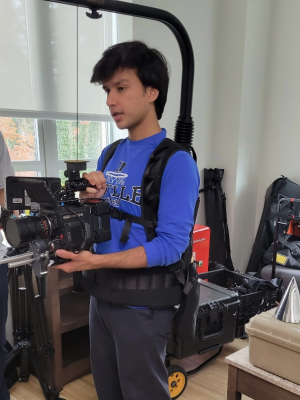When Cinematic Arts Brings Economics into Focus

What inspired an Economics and Mathematics dual major to also pursue a seemingly disparate minor in Cinematic Arts? For Parinay Gupta, it was his Writing 101 course: Gender and Sexuality in Latin American Films.
“Delving into the analysis of gender representation in Latin American cinema, I became increasingly intrigued by the creative processes that transpired behind the camera and shaped the narratives presented on screen,” he explains.
He took an acting course in Theater Studies in the spring and followed with a summer opportunity to explore theater overseas, thanks to the Duke in London-Finance program offered through the Global Education Office. It was during this time that Gupta found himself torn between Theater Studies or venturing into cinematic arts.
“To make an informed decision, I enrolled in an acting class tailored for film acting, taught by Chauntee’ Irving,” he shares. “This course was transformative, providing a deep dive into the technical aspects of filmmaking and sparking a profound appreciation for the intricate art of crafting cinematic narratives.”
Acting in a production with Freewater Productions, Duke's student film production house, Gupta saw the collaborative process of bringing emotions and stories to life on screen — his passion for cinematic arts was cemented.
With such a clear and concrete appreciation for film, why did he select a dual major in STEM?
“I was drawn to Economics because of its power to unravel the mysteries of consumers and enterprises at a micro level to global economic forces at the macro level,” he says, “and Mathematics captivated me with its universal language.”
Gupta is currently working on his Economics honor thesis, exploring the role of intergenerational transfers (financial assets and human capital) in explaining the wealth gap between minority and majority racial groups in the United States. Recently, he presented his work on the Black-white and Hispanic-white wealth gaps at the Global Inequality Research Initiative Capstone Conference at Duke and the Black Doctoral Network Conference in Atlanta.
The busy senior is also a teaching assistant for core Economics courses and a Trinity Ambassador, as well as the co-president of the Duke Economics Student Union.
We sat down with Gupta to learn more about the advantages that come with his specific mix of interdisciplinary studies, what a cinematics arts minor can look like and what direction he wants to take after graduation.
Do you find your STEM and arts courses mutually beneficial?
Absolutely. My exposure to cinematic arts unearthed a creative perspective within me. Despite my primary focus on Economics and Math, I bring a creative approach to problem solving, influenced by my experiences in the arts.
I experiment with various lenses, lighting and camera movements during film shoots and recognize that film is essentially a juxtaposition of images. I understand the strategic placement required for each scene, shot and frame to convey intended emotions and contribute to the characters' objectives — and I apply a similar mindset when experimenting with methods and techniques as I construct mathematical proofs.
This intentional and awareness-driven mindset seamlessly extends to my research endeavors in Economics. Every choice I make, from formulating research questions to selecting variables, is guided by logic and reason. The ability to approach problems creatively and analytically is important, and I find experiences in the arts can be extremely enriching towards my academic pursuits in Economics and Mathematics.
At the same time, my STEM coursework has significantly enriched my arts studies. The structured and logical approach fostered in Math courses has translated into a methodical way of approaching film projects. For instance, when developing a script or planning a production, I draw on the analytical mindset cultivated in Mathematics to ensure a cohesive narrative and an organized production process.
Economics courses have honed my ability to understand and analyze complex systems, a skill that proves invaluable when comprehending the intricate relationships within a film's storyline, character dynamics and thematic elements. Economic theories often involve navigating intricate webs of cause and effect, which mirrors the complexity of super objectives and conflicts in cinematic narratives.
The quantitative skills acquired in my Math courses have proven beneficial in the technical aspects of filmmaking. Whether it's understanding camera angles, focal lengths or editing sequences, the mathematical foundation has provided a structured framework for problem solving in film production.
What does your Cinematic Arts coursework look like?
Cinematic arts is housed in AAHVS, and the department’s curriculum emphasizes a balanced blend of “studies” and “practice” courses, allowing me to gain comprehensive insights into the world of cinema. My coursework has been diverse, encompassing practice courses such as acting for camera, editing and cinematography, alongside film studies.
My courses also allow me to dawn different hats: sound, camera and lightning assistants, producer and cinematographer. The hands-on experience of independent filmmaking has been instrumental in learning the technicalities of the equipment and honing my skills and passion for the arts.
And I’m actively involved in student projects under the umbrella of Freewater Productions, where I’ve acted in and directed film projects exploring sensitive topics such as hookup culture, male victimhood and the dynamics of organizational hierarchies.
In what direction are you steering your career?
My immediate goal is to combine the sciences with the arts in the financial sector. I’m interested in building technical competency in financial valuation and business research, combining it with interpersonal values of relationship building and negotiation.
For the long term, I intend to build a socially conscious enterprise that creates value for consumers and its people alike. While my Economics and Math coursework will make me adept at the analytical and quantitative part of my goals, my experiences in the arts will lend me a unique lens of original creativity as I approach problems.

